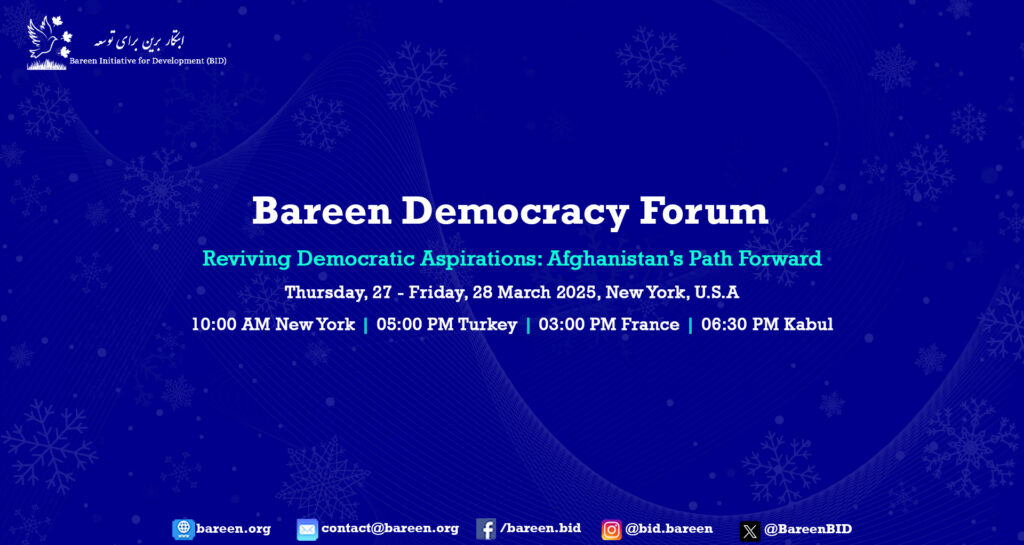Reviving Democratic Aspirations: Afghanistan’s Path Forward

Concept Note
Background:
Afghanistan has undergone significant political shifts in recent decades, with moments of democratic progress interrupted by periods of authoritarian rule. The Taliban’s return to power has resulted in a severe democratic backslide, restricting civil liberties, human rights, and governance structures. Despite these challenges, the aspirations for democracy remain strong among Afghans both inside the country and in the diaspora. The Bareen Democracy Forum aims to reignite discussions on Afghanistan’s democratic future, bringing together Afghan civil society, international advocates, and policymakers to strategize, mobilize, and support efforts towards democratic governance.
Objective:
- Facilitate dialogue between Afghan civil society, international democracy advocates, scholars, and policymakers to develop actionable strategies for democratic reform.
- Educate, inspire, and mobilize local and international stakeholders to support democratic initiatives in Afghanistan.
- Emphasize inclusivity in democratic processes, ensuring the representation of women, youth, and marginalized communities.
- Create a roadmap for democratic revival, outlining key priorities and strategies for sustainable governance.
Participants:
- Afghan civil society leaders and activists
- International human rights organizations and democracy advocates
- Scholars and researchers specializing in democracy, governance, and Middle Eastern politics
- Representatives from democratic governments, international institutions, and think tanks
- Former Afghan government officials and policymakers
- Media representatives and journalists covering Afghanistan
Forum Structure & Proposed Event:
Welcoming remarks by the Bareen Initiative for Development (BID) Director General.
Panel I: “The State of Democracy in Afghanistan: Building Inclusive Governance Structures”
Objective: To explore Afghanistan’s current political landscape, identify challenges, and discuss opportunities for democratic reform.
Description: A panel discussion featuring Afghan activists, political analysts, and former officials will explore Afghanistan’s current political landscape, identifying key challenges and opportunities for democratic reform. An interactive workshop where participants will examine models for inclusive governance, focusing on:
Key Topics:
- The impact of recent political changes on democratic governance
- The role of civil society in safeguarding democracy
- Lessons from past democratic experiments in Afghanistan
- The role of women, youth, and minorities in political decision-making
- Case studies from other countries on rebuilding democracy
- Legal frameworks and policies to ensure inclusive political participation
Panel II: “The Role of the International Community in Supporting Afghanistan Democracy”
Objective: To discuss how the international community can effectively support Afghanistan’s democratic aspirations, while respecting Afghan sovereignty.
Description: A high-level discussion featuring representatives from international organizations (e.g., UN, EU, NGOs), diplomats, and Afghan activists. Topics will include:
- The role of foreign governments and multilateral organizations in supporting democracy
- Strategies for effective international engagement while respecting Afghan sovereignty
- Opportunities for Afghan-led advocacy efforts in the global arena
Panel III: “Voices from the Ground: Afghanistan Youth and Democracy”
Objective: To highlight the perspectives of young Afghans on the future of democracy in their country.
Description: A live-streamed event where young Afghans (both inside and outside the country) will share their visions for Afghanistan’s democratic future. This session will serve as a platform for young voices to:
- Express their concerns and aspirations for governance
- Propose innovative solutions for political engagement
- Build solidarity and networks for youth-led advocacy
Panel IV: Closing Plenary “Crafting a Roadmap for Democratic Revival”
Objective: To create a concrete action plan for the future of Afghanistan’s democracy, focusing on sustainable governance strategies.
Description: The final session will synthesize insights from previous discussions into a concrete action plan. Key elements will include:
- A democracy roadmap outlining immediate, mid-term, and long-term strategies
- Formation of working groups for ongoing advocacy and implementation
- Recommendations for policy reforms and civil society initiatives
Expected Outcome:
- A comprehensive analysis of Afghanistan’s democratic landscape, challenges, and opportunities
- Formation of a strategic action plan for democratic reform and advocacy
- Stronger networks between Afghan civil society, international organizations, and policymakers
- Increased global awareness and commitment to supporting Afghanistan’s democratic future
Next Steps & Sustainability plan:
- Working Groups & Task Forces: Participants will be invited to join dedicated working groups focusing on key areas (e.g., women’s political participation, youth engagement, legal reforms).
- Follow-up Meetings: Regular virtual meetings will be scheduled to track progress, refine strategies, and adapt to new challenges.
- Policy Briefs & Reports: A final policy report summarizing key recommendations will be published and shared with international organizations, policymakers, and advocacy groups.
- Public Awareness Campaigns: Social media campaigns, op-eds, and webinars will be launched to sustain engagement and keep democracy at the forefront of global discussions on Afghanistan.
Conclusion:
The Bareen Democracy Forum is a vital step in rekindling democratic aspirations in Afghanistan. By fostering dialogue, mobilizing support, and developing concrete strategies, the forum will serve as a catalyst for sustained democratic engagement. Through collaboration and strategic action, Afghan civil society and its international partners can work towards a future rooted in democracy, governance, and human rights.
